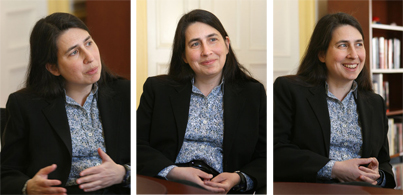ENTRE NOUS with Jody Heymann, Founding Director, McGill Institute for Health and Social Policy
Where the research rubber hits the policy road

Jody Heymann is McGill’s Canada Research Chair in Global Health and Social Policy, a pediatrician and a musher.
Owen Egan
When Jody Heymann talks, people tend to listen. The founding Director of the McGill Institute for Health and Social Policy (IHSP), Heymann is one of the world’s leading experts on working families. She has explained the plight of poor working families in America to the people who rarely court their votes: the United States Congress. She has advised the United Nations Educational, Scientific and Cultural Organization (UNESCO), the World Health Organization (WHO), and the U.S. Centers for Disease Control and Prevention. Most recently, she testified before the Ted Kennedy-chaired Senate Committee on Health, Education, Labor, and Pensions in support of a bill to provide American workers with paid sick leave following the publication of her new study, The 2007 Work, Family, and Equity Index: How Does the U.S. Measure Up?
People would find it hard to believe that in a country as wealthy as the United States, paid sick leave isn’t a given.
It’s really incredible when you consider that 145 countries provide some sort of guaranteed paid sick leave to workers and the U.S. doesn’t. Just think, one-third of families in the States have two or more weeks of illness per year and one-quarter have three weeks or more. Yet three-quarters of low-income families don’t get a single day of paid sick leave.
What kind of impact does that have on a family?
Obviously, it puts households at an economic risk because wages are lost when people take time off to care for a family member. In the end, it has a serious impact on children’s health because often their parents just can’t afford to take time off when they are sick.
What has it been like working with Senator Kennedy?
It’s been immensely rewarding to work with the Senator and the Senate on the development of this bill since the very beginning. We’ve worked closely with folks in Washington and across the U.S., had superb collaborations with the wide range of policy-makers and community-based groups involved. The legislation that came out of these collaborations provides a wonderful example of how crucial it is to work at the intersection of research and policy.
Tough times to be an American worker?
The bad news is that the U.S. has gotten to the point where it is near the bottom when it comes to labour protections. The good news is that there is renewed energy at every level to work for change from U.S. senators to state legislators to grass root organizations.
How does Canada rate?
Compared to the United States, Canada does very well but it still has issues that need to be addressed. One example, availability of early childhood care and education, which Quebec has led on but much of the country still needs to catch up. Another gap to be filled is breast-feeding breaks for working mothers. It doesn’t sound like a big deal until you realize that breast feeding can reduce the rates of infant mortality three- to five-fold.
Your 2006 book, Forgotten Families, spans five continents and is based on interviews with more than 55,000 families. What were some of the more shocking findings?
One of the things was how many young children under the age of five were being left home alone. In low-income families as many as one-third of preschoolers were left alone or under the care of young children while their parents worked. It’s just one of the many areas the world has neglected.
Forgotten Families has been praised for its exhaustive research as well as its vivid portraits of individuals struggling to survive. How important is storytelling to this book?
We conduct many large-scale statistical studies—and these are crucial in order to quantify the size of the problem. At the same time, sharing experiences of individual parents and kids often is what makes us care enough to take action as individuals and communities. When people read about 10-year-old Ramon, struggling to care for his five siblings under the age of five, trying to figure out what to feed an infant—that’s what makes people understand.
When you’re not running the IHSP, teaching, writing or bending the ears of prominent policy-makers you like to unwind by dogsledding. How did you get involved in that?
[Laughing] By listening to my son, who eight years ago said it was something he wanted to do. We both love camping, so we gave it a try. Since then we go on week-long dog sledding and winter camping trips as often as we can.
Any aspirations of doing the Iditarod?
One sabbatical, if I ever get caught up with the rest of the challenges we’re racing against time to address.

